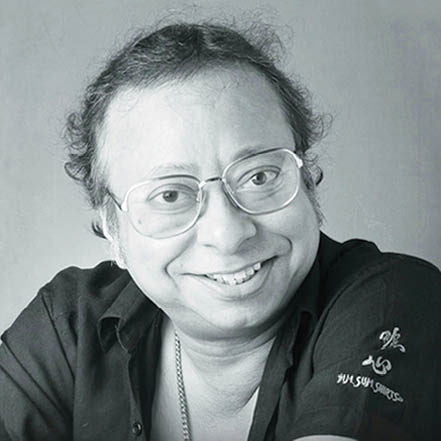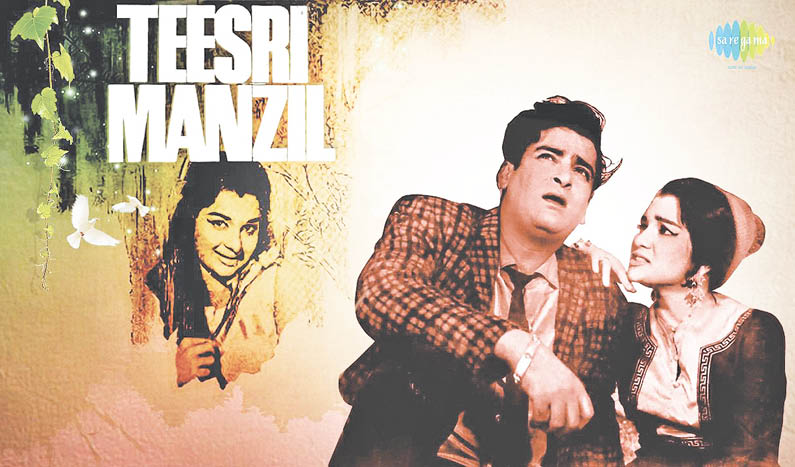
“Rocky, tumhein wahaan nahin jaana chaahiye”, with these seductive words and accompanied by trendsetter Rahul Dev Burman’s pulsating background score (no doubt, aided by Cawas, Kersi and Burjor Lord) does the film begin. Hindi cinema’s leading femme fatale, the Franco-Burmese Helen was at the pinnacle of her career when she got to speak the opening lines of a film, probably for the first time in her career, which began 65 years ago.
The story by Nasir Hussain (more or less on the lines of his Tumsa Nahi Dekha) was fairly uncomplicated – Anil Kumar ‘Sona’ alias Rocky is a drummer in a Mussoorie hotel. Sunita (Asha Parekh) thinks her sister, Rupa, commuted suicide by jumping off the third floor of the hotel after a failed romance with Rocky. She arrives at the hotel to avenge her sister’s death. Rocky thus disguises his identity. The two begin a romance, even as the police discover that it was murder and not suicide. With no fewer than four villains surfacing at various junctures in the film – K. N. Singh, Prem Chopra, Premnath and Rashid Khan – the viewer is left guessing till the final stages of the 172-minute film.
This exhilarating thriller, released way back in 1966, owes its stupendous success to a number of factors – Nasir Hussain’s story, screenplay and dialogues; Vijay Anand’s (Goldie) direction and taut editing; the remarkable and rhythmic combination of lyricist Majrooh Sultanpuri and composer R. D. Burman; and lastly, Mohammed Rafi’s vocals which went apt on the ebullient Shammi Kapoor, who was nearing his sell-by date as a hero (after TM, he appeared in fewer than 10 films as the leading man).
Nasir Hussain, who began his career as a writer for other producers, shot to fame as the director of Tumsa Nahi Dekha 1957 (he also wrote its screenplay, story and dialogues). This was Shammi Kapoor’s first hit after a string of 18 hugely forgettable films. After directing Shammi again two years later in Dil Deke Dekho, he made the highly successful Jab Pyaar Kisise Hota Hai (the first under his own banner) in 1961 with Dev Anand. This was after a fallout with Shammi. Dev was signed again for Teesri Manzil but a major row between Hussain and Dev Anand meant that Shammi was roped in for their “third tryst”. TM would be Hussain’s fifth film, either as director or producer.
As to who would fill the heroine’s shoes, there was never a doubt. Asha Parekh had already worked with Hussain in DDD, JPKHH and Phir Wohi Dil Laya Hoon, and the two were rumoured to be quite close.

Originally, it was Nasir Hussain who was to direct TM, while Goldie was signed by Nasir Hussain to direct Bahaaron Ke Sapne. In a reversal of fate – and for reasons too profound to go into here – Goldie was now handed over the reins of ‘The Third Destination’. Goldie was overjoyed as he loved directing romantic musicals. This would be his first directorial venture outside the Navketan banner and without Dev Anand as hero. And by a coincidence, his fifth film as director!
Which brings us to the apogee of Teesri Manzil: its music. Majrooh Sultanpuri, who had worked with Hussain earlier and was signed for TM, had written the lyrics of six films where the young Rahul had assisted his father Sachin Dev Burman. Impressed by his talent, Majrooh recommended Pancham to Hussain. By an eerie coincidence, all of Goldie’s films till then had music by the senior Burman, and all of them had the young Burman assisting his father in them. He too recommended Pancham for the job. Hussain promptly signed him on for five films. (They eventually did a total of nine films together.) But there was one obstacle – Shammi Kapoor.
The latter wanted his favourites Shankar-Jaikishen (Junglee, Professor, Dil Tera Deewana) or even O P Nayyar (Tumsa Nahi Dekha, Kashmir Ki Kali). Hussain got around the predicament by urging Shammi to at least listen to the youngster’s tunes. Three tunes later ‘Deewana mujhsa nahin’, ‘Aa jaa aa jaa’ and ‘O haseena zulfonwaali’, Shammi nodded in assent. Everything had fallen into place.
The music of TM was certainly far ahead of its time. All the six songs of the film (four duets by Rafi-Asha and two Rafi solos, recorded by Minoo Katrak) sound fresh and youthful even today – my personal favourites being the ‘Tumne mujhe dekha’ solo and ‘O haseena zulfonwaali’. The song sequence of this duet, with some close-ups and long shots, is among the most opulent to be shot in the annals of Hindi cinema till then. Shammi’s exaggerated and Helen’s exquisite dance movements add to Rafi’s and Asha Bhosle’s easy-flowing melodic voices. The drummer in black in the song is Salim Khan (who later went on to marry Helen), father of Salman Khan.
Shammi’s then wife, Geeta Bali, had died during the shooting of the film. The entire crew waited for Shammi to get over his grief. Three months later, shooting resumed with the song ‘Tumne mujhe dekha’. Watch Shammi’s expressions closely during the song and you will know what I’m getting at.
Teesri Manzil remains the only film of the master storyteller Nasir Hussain not to be directed by himself. Earlier this year on 22nd October, during the MAMI Film Festival, I had attended a discussion where Nasir Hussain’s son Mansoor Khan, director of Qayamat Se Qayamat Tak and nephew of Aamir Khan, were among the panelists to promote Hussain’s biography. During the discussion, when the author Akshay Manwani mentioned that Teesri Manzil was a ‘collaborative effort’ between the subject of his book and Vijay Anand, I pointedly asked him why the two didn’t work together again, especially after such stupendous success! He was at a loss for a reply. Aamir intervened to tell me, “these are the ways of the industry… today you pitch a tent here, there tomorrow.”
All things considered, Teesri Manzil remains a watershed film in the annals of Hindi cinema – an out-and-out entertainer by which musical murder thrillers are benchmarked even today.
- Sau Saal Pehle… Celebrating Mohammed Rafi’s Birth Centenary - 21 December2024
- Parsee Gym Retains Supremacy In 7th Late Manek Golvala T10 Cricket Cup - 13 April2024
- Parsee Gym Holds 9th All-Parsee TT Tourney - 6 April2024
